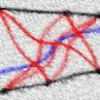 21
21my solution : if the given expression equals zero (p,p2) , (q,q2) , (r,r2) will be collinear
p,p2 ,q,q2 ,r,r2 are distinct points on the parabola y= x2
but a straight line intersects a parabola at maximum 2 points
so the given is nonzero
i am looking for a basic algebric proof
 71
71(p,p2) , (q,q2) , (r,r2)
How do you infere this please let me know.
 341
341Its true for the simple reason that \sum pq(p-q) = -(p-q)(q-r)(r-p)
Now, how did we arrive at the factorisation?
This is a well known technique. By setting p=q, we see that the expression equals zero
So, (p-q) must be a factor of LHS.
So (p-q)(q-r)(r-p) divides LHS. Comparing the degree, we see that
LHS = K (p-q)(q-r)(r-p) where K is a constant.
Comparing the coeff of p on both sides, K=-1 and we are done
 21
21thank you very much sir thanks a lot
 341
341We can tie this with Shubhodip's remark about the points.
If the points are collinear then the are of the triangle formed by the three points is zero i.e.
\begin{vmatrix} 1 & p& p^2 \\ 1&q &q^2 \\ 1 & r & r^2 \end{vmatrix} = 0
Now look at the Vandermonde determinant
http://en.wikipedia.org/wiki/Vandermonde_matrix
You can now see why we must have p≠q≠r